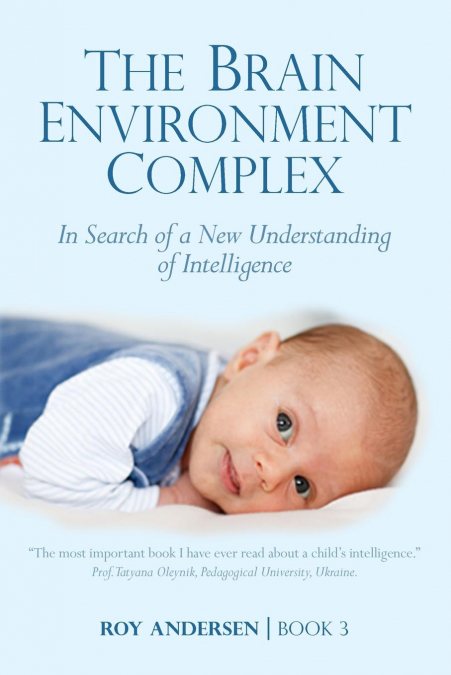
Roy Andersen
We think of intelligence as something inherited and something developed, but what is it that we actually inherit that allows us to have a quality of intelligence?Could it be that we inherit genetic codes not for intelligence but for the brain to devise itself through the information that reaches it from the outside world, and then how the mind interprets the meaning of this information? If so this would explain why intelligence varies with people of different cultures and so of different social levels, as each group sees the collective meaning to information differently.‘The Brain Environment Complex’ builds upon this principle to examine how intelligence forms and develops in the individual, by examining how neural networks form in the foetus, and how these networks become shaped by the later psychology of the mind, as behavioural experiences alter the brain’s chemistry and so construct the ability for intelligence. Intelligence is far more associated with behavioural experiences than we understand, as both ride upon the emotions of the individual. To understand how intelligence comes to be in the individual, this book explains the roles of diet, language, emotion, and how a complex array of intellectual and behavioral strategies pull it into shape.To understand why intelligence is not so restricted in the individual as we have come to believe, we begin this book with a discussion of how the human brain is actually brought into construction. As we do this, we will see that the parts of the brain that deal with the body’s normal functioning are indistinguishable between individuals. The hindbrain of each person will be remarkably similar. In contrast to this we will find that the cerebral cortex, the part of the brain that deals with environmental information and so provides our ability for intelligence, will be uniquely shaped between individuals, as its neural networks were brought into formation by synapses being stimulated by desire and inhibited by concerns. Through this, we will better understand how and why the effectiveness of an individual’s brain to interrogate information, and to associate what is new to what has been stored, is based upon learned and developed strategies. These strategies are reliant upon a quality of language, and the individual’s ability to control the fears and distractions imposed upon them by others.This affect of behavioral experiences on a child’s ability to learn is little understood in education, because as a processing system it takes what the child presents as what they are, in essence, said to be genetically capable of presenting. The truth of the matter is that it is the overall behavioral atmosphere of their learning development, that directly determines how the individual is able to interrogate, process, and present the information they will be evaluated on.As we will find that language is the base of intelligence, so will we discuss how the individual is born with particular schemas that enable them to develop their intelligence through language processes. These processes, which chemically bond the child and their parent, just as they do the student and their teacher, are continually tested by the personality differences, energy, and the shifting desires between them as they share each minute interaction.By the influences of their parents, by the language of the child, by their personality drives, and by the opportunities they have to control or avoid the mental pressures of their peers, each child gains their understanding of when, where, and how to learn in school. Without understanding the real effect of these, we make great error when we think we know what their intelligence is.